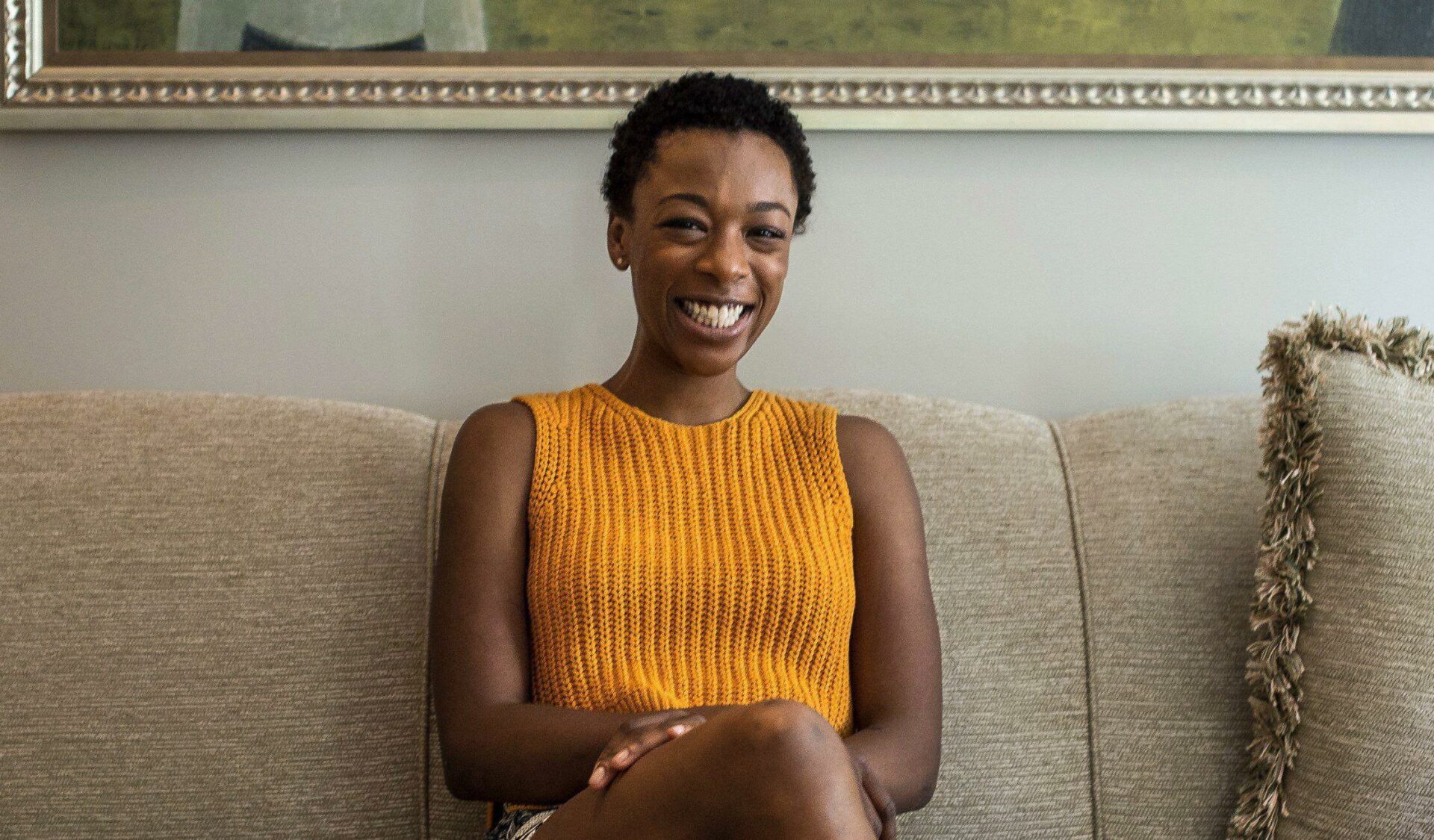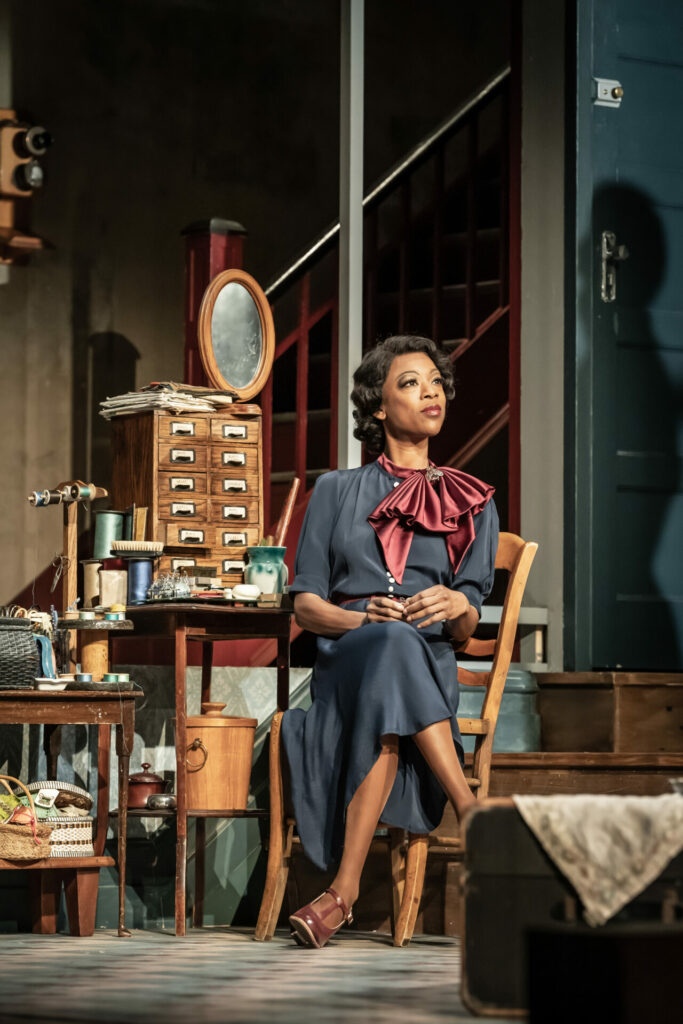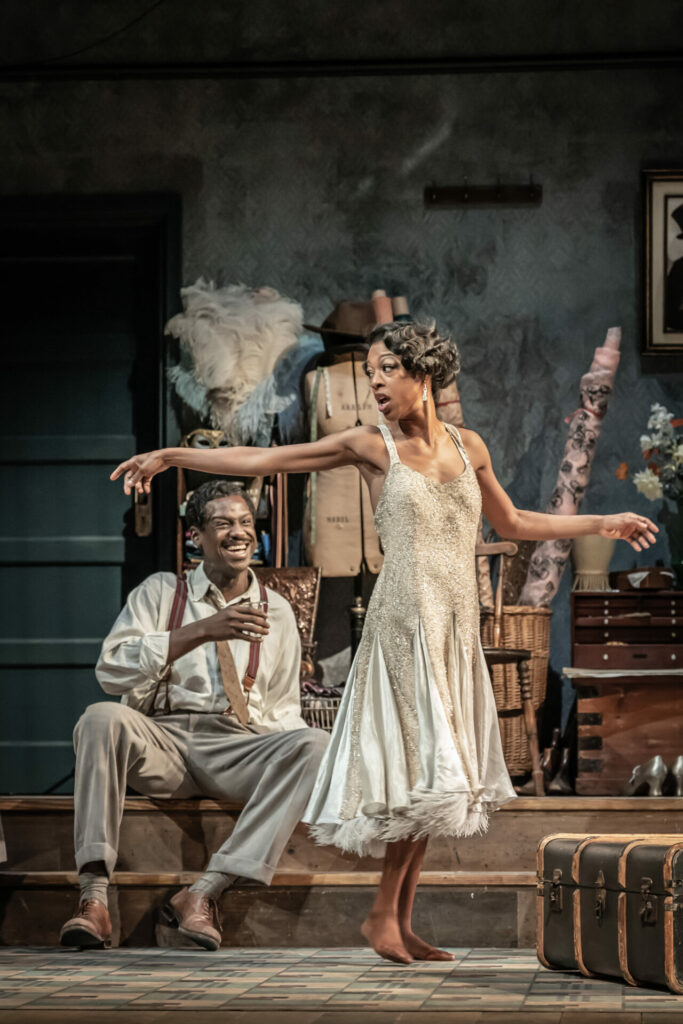Samira Wiley wants to see more straight actors step aside for queer actors
Exclusive: As Samira Wiley makes her London stage debut in Blues For an Alabama Sky, the Orange Is the New Black star talks structural discrimination and why she never lost her ability to dream.

So loveable as Poussey in Orange Is the New Black and so compelling as Moira in The Handmaid’s Tale, Samira Wiley is now winning raves for her first UK stage role as Angel in Blues For an Alabama Sky at the National Theatre.
The character is a boozy singer in 1930s Harlem who falls for the wrong man in a play that tackles themes of race and abortion as well as, through the character of Angel’s best friend Guy, being out and proud – something which Samira has herself been since she first appeared as Poussey in 2013.
With the play running for two more weeks and The Handmaid’s Tale back on TV, Simon Button talks to Wiley about her love of theatre, what’s in store for Moira and her views on queer actors playing queer roles…
How has it been making your UK stage debut?
Theatre has always been my love and I’ve always wanted to end up here. My mother was actually born in London but I’d never been here before. When I think about the global conversation about theatre it’s New York and London, and the National Theatre has been the most amazing place to work. They’re so welcoming and the level of talent around me is just incredible. The biggest challenge for me has been the fact that I had bronchitis, then I got Covid and was off for another week. That’s been the most frustrating part. The run is only five weeks and I’ll have missed almost half of that.

Any nerves about appearing on the London stage?
Of course but when something scares me, like when I’m thinking ‘I’m afraid of this challenge’, that’s where the excitement and the magic can happen. I’ve always been kind of afraid of playing Angel but I’m having a blast doing it. There are so many things about her that I’ve never gotten the chance to play before. After Orange Is the New Black, the characters I started to get offered were just a lot of homosexual roles. I absolutely think that is such a privilege and an honour, to live in a time where you can have an actual Black gay woman play a Black gay woman. That didn’t exist when I was young. But in the same way I’m an actor to play things that I’m not myself so to be able to play this sexpot from the 1930s, that’s not really who Samira is. Angel is so fun. She’s the life of the party.
How do the themes of race relations, sexuality and abortion in Pearl Cleage’s play speak to today?
When the director Lynette [Linton] first brought me the play in 2019 I said to her ‘How could it be more timely?’ Little did I know that in the next two or three years Roe v. Wade would be no more. Especially in my home country, all of the things we’re talking about in this play are things we’re talking about in real life. It feels important and something I want to be giving my voice to. I’m really passionate about women’s rights, about LGBT+ rights and about people being seen as three-dimensional human beings. Ultimately I think this story is a tragedy but for at least the entire first act you’re just watching Black joy. Even though hard times are going on around them, in the middle of the Depression in Harlem, this group of friends get through it by going ‘What are we gonna do tonight? We’re gonna party!’
Giles Terera plays Angel’s gay best friend Guy, who is defiantly out and proud. Do you see him as being ahead of his time?
He’s completely ahead of his time but a lot of the people we speak about in the play are real people – not just famous names like Josephine Baker but also there’s a character we talk about a lot whose name is Bruce. Bruce was a real guy. He was a gay guy who walked around barefoot in Harlem, he was always having new lovers. The characters are inspired by people who were living and breathing and being radical in that time. And Giles does an amazing job, so Guy feels so real to us.
You and Giles have such great on-stage chemistry. I’m guessing you’re now great friends off-stage too?
Oh my gosh, I love that man! The relationships you create off-stage or off-camera are sometimes undeniable. They bleed into what you see on stage or on screen, and hopefully it’s bleeding in the right direction. We really like each other and I think that shows.
There’s still a debate about whether only queer actors should play queer roles and vice versa. What are your thoughts on that?
Personally I don’t think the conversation is the same both ways. For our entire history, in my queer community we haven’t been able to play our own characters because this guy is getting an Oscar for playing that guy and this woman’s getting an Oscar for playing gay and it’s so amazing because none of them are gay, right? But actually it’s like ‘Wouldn’t it be revolutionary if…’. There’s work that needs to be done there. I’d love to see more heterosexual actors stepping aside and saying ‘No, that’s not my story to tell right now’.
Does that work the other way, though?
I don’t think the conversation is the same on the other side. It’s just not a problem we’ve ever had, like ‘Straight people can’t play straight people’. That’s not a world we’ve lived in. Once it’s no longer an issue where queer people don’t feel they’re able to tell their own stories, once that’s a level playing field, then it will get to a point where it doesn’t matter who’s playing what.
We got to know you as Poussey on Orange Is the New Black. What did you most enjoy about playing her?
That character gave me my entire career. She gave me the confidence as a screen actor and I learned everything through that role. Somehow I was blessed with a character who was so universally beloved by fans everywhere. Her death really impacted people and it really impacted me. I remember my mother telling me she felt like she’d lost a friend. I was like ‘Wow, that’s my mum and she knows it’s not a real person’. To see how much difference I could make just through playing a character was something I never knew before, and what a joy she was. Of course she was in prison but she really was just a joy and so fun to play. I will always look back at that time as being a gift.

Season five of The Handmaid’s Tale is now on TV in the UK. What can you tease about what’s in store for Moira?
Last season we saw her trying to figure out how to reintroduce herself to June. It’s been years since they’ve shared the same space and when that happens we want to hold onto the idea of a person that we have in our head but Moira is having to come to terms with the fact that ‘This is not the same person’. Moira and June split off at the exact same period in their lives, Moira has spent the last five years in Canada being able to have therapy, work with refugees and heal but June has been re-traumatised over and over again. Moira’s mindset is one of forgiveness while June is on a path of ‘Kill, kill, kill them all!’ Moira used to be that fighter but her circumstances have changed. When you become a mother, as I now know in my own life, your priorities change. A lot of the fifth season is her figuring out ‘Where do I fit and is this friendship the same?’ It’s a navigation of who they are to each other. Some of that is heartbreaking.
You’re now a wife to Lauren Morelli and, as you say, a mother to your daughter George. Growing up, did you ever imagine a time when that would be possible?
I’ve always been very in touch with a desire to be a mother my whole life. I never really went into ‘So in order for that to happen you will need to do this, and that might be impossible, and that, which also might be impossible’. I was just like ‘I’m gonna be a mum and that will figure itself out’. As for being married, both of my parents are Baptist pastors but also very progressive. They were doing union ceremonies in Washington D.C. in their church when it was illegal. They were very clear on what they thought was the Christian thing to do, which I think is the opposite to what most Christians feel is the Christian thing to do. My parents are amazing, liberal and radical, and that’s the home that I grew up in. I never lost my ability to dream, so even though I didn’t have the ‘how’ I still had that dream for myself.
Blues for An Alabama Sky is at the National Theatre, London, until 5 November. The Handmaid’s Tale season five is on Channel 4 and Amazon Prime.
For more great deals on theatre tickets click here.
